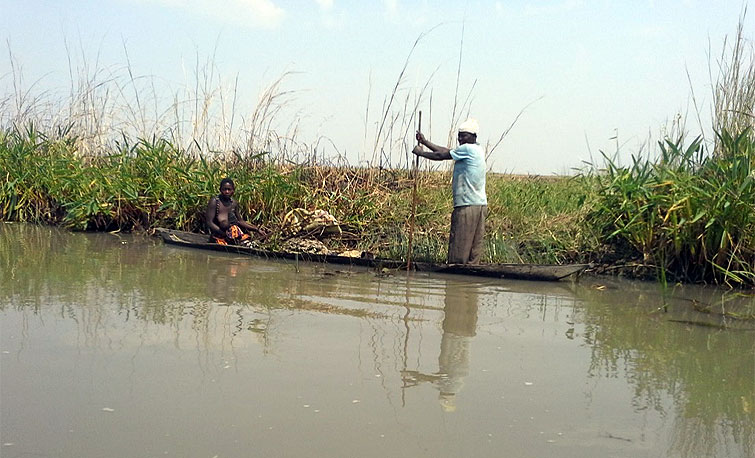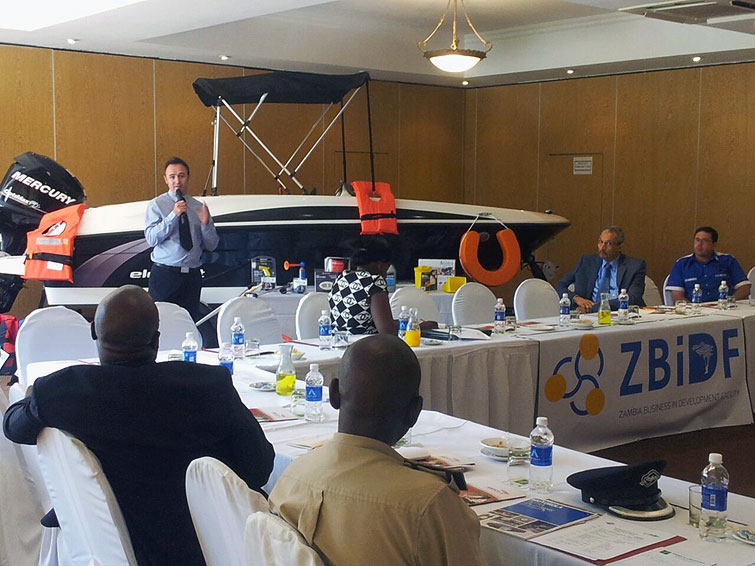 A Marine Safety Dialogue Workshop was held on 23rd March 2015 at Sandy's Creations in Lusaka. The workshop was sponsored by Autoworld, who are stockists of an extensive range of automotive, marine and lifestyle products in Zambia. It was promoted by the Zambia Business in Development Facility (ZBiDF) and graced by Hon. Yamfwa Mukanga representing Zambia’s Vice President, Hon. Inonge Wina. This Marine Safety workshop was organised as a response to the tragedy that happened on Independence Day 2014 when 22 school children and 3 adults drowned in Lake Kariba.
A Marine Safety Dialogue Workshop was held on 23rd March 2015 at Sandy's Creations in Lusaka. The workshop was sponsored by Autoworld, who are stockists of an extensive range of automotive, marine and lifestyle products in Zambia. It was promoted by the Zambia Business in Development Facility (ZBiDF) and graced by Hon. Yamfwa Mukanga representing Zambia’s Vice President, Hon. Inonge Wina. This Marine Safety workshop was organised as a response to the tragedy that happened on Independence Day 2014 when 22 school children and 3 adults drowned in Lake Kariba.
About ZBiDF
ZBiDF (the Zambia Business in Development Facility) is a multi-stakeholder platform comprising of champions from business, government, donors and civil society in Zambia. It is designed to engage business and facilitate dialogue and innovation, as well as directly support public-private partnership action on key business and development challenges. ZBiDF’s mission statement is to “systematically support and catalyse cross-sector partnerships in order to unleash the power and resources of business on poverty reduction and improve development outcomes, while achieving business benefits”.
Sector Representation and Composition
The workshop comprised of a cross sector meeting with representatives from government, business and development agencies:
- Government- Ministry of Transport, Works, Supply & Communication (Marine Department) and the Zambia Police Service (Marine Unit)
- Business - Madison General Insurance, Autoworld (Z) Ltd, ZISC General Insurance and Aliboats
- Development agencies - the African Management Services Company
Deliberations and Resolutions
The Marine Safety Dialogue Workshop discussed three presentations from different stakeholders as follows:
- Presentation 1: Safety of Navigation in Zambia - a presentation made by the Maritime Department at the Ministry of Transport, Works, Supply and Communications (MTWSC). The department reiterated the importance of marine safety in stating that ‘Safety was not a Game of Chance, but an action that required deliberate interventions like the mandatory use of seat belts in our motor vehicles that enhance the safety of road users.’The department highlighted several factors that contribute to marine safety, including the seaworthiness of vessels and the loading capacity of vessels. The department shared that implementations of safety measures are hindered by several challenges such as the inadequacy and weakness of marine regulations and low staff levels which hinder effective water patrols. The Ministry nevertheless has recently contracted Aliboats to supply a number of vessels for monitoring purposes.The need for a nationwide education and awareness raising campaign on marine safety was recognised as one way of ensuring that people adopt safe practices whilst on water. Also pointed out was that the Inland Waters Shipping Act of 1961 (Chapter 466 of the Laws of Zambia, otherwise known as CAP 466) excludes non-motorised vessels such as dugout canoes; and the meeting was informed that many of the marine accidents that occurred on the water bodies are largely from such crafts.
- Presentation 2: Marine Safety Enforcement initiatives and challenges - A presentation was made by the Zambia Police Marine Police Unit who concurred with the observations made by the Department of Maritime and Inland Waters with regard to the challenges of enforcing marine safety. It also pointed out that in its current form, CAP 466 does not empower the Marine Unit to effectively enforce marine safety in the same way that the Road Traffic Act No. 11 of 2002 empowers the Road Traffic Police Unit and the Road Traffic and Safety Agency (RTSA) with regard to licensing, penalties and sanctions. The Marine Police Unit stressed the need for investment in radio communication equipment (VHF channels) by both boat owners and government.
- Presentation 3: Private Sector Proposition - Autoworld Zambia’s marine division presented that the private sector users in areas such as Mongu-Kalabo had adopted a mandatory practice of life jacket use. Contrary to the notion that life jackets are expensive, it stocks a variety of life jackets with the cheapest being K100.However there were other significant factors related to water safety - specifically the state of the boat engines and water crafts, and the presence of bilge pumps, portable horns, paddles, running lights, communication equipment and fuel containers, all in good working order.
Six point action plan
The stakeholders identified six important issues that needed to be resolved in the short term in order to enhance marine safety:
- Overhauling CAP 466 - the responsibility of the Department of Maritime & Inland Waters - by end Dec 2015
- Building a marine safety awareness partnership - the responsibility of ZBiDF - by end March 2015
- Issuance of a press statement to highlight the meeting and the way forward - the responsibility of ZBiDF - by end March 2015
- Soliciting for more funding – prepare monthly budgets to motivate for more funding - the responsibility of MTWSC/MoFnp - by end March 2015
- Increasing the number of marine staff – employ more staff to man harbours, and purchase new boats - the responsibility of MTWSC/MoFnp - by end Dec 2015
- Increasing marine infrastructure – specifically offices, patrol boats and navigation beacons - the responsibility of MTWSC/MoFnp - by end Dec 2015
- Enhancing ship to shore communication (radio) - the responsibility of MTWSC/ZICTA - by end Dec 2015
Vice President’s address
Honourable Yamfwa Mukanga, Minister of Transport, Works, Supply and Communications welcomed the initiative in a speech he read on behalf of the Vice President, indicating it had come at the right time. She directed that the outcomes of the meeting incorporated the following:
- Increased community awareness and education
- Better adherence and enforcement of regulations
- More affordable access to lifesaving devices and vessels
- Enhanced communication and rescue measures
Wrap up by Autoworld’s Chairman
In conclusion, Autoworld Chairman Mr Noble Findlay gave a vote of thanks to the Vice President’s speech and noted that as a business, Autoworld appreciated that government had taken time to join the gathering to deliberate on marine safety. He also encouraged the Minister to consider removing VAT on life jackets as a way of making them even more affordable for the communities that live near water bodies.
In response, the Minister instructed staff from the Maritime and Inland Waterways Department to immediately commence action that would lead to the repealing and replacement of CAP 466 and the removal of VAT on life jackets in the 2016 Budget, as a measure of the government’s commitment to improve marine safety in Zambia.


